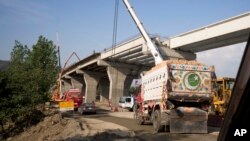Pakistan announced Monday a reduced estimated cost for revamping of the country’s nearly 1,900-kilometer colonial-era railway line under an ongoing bilateral economic development mega project funded by China.
The upgrade to “standard gauge” of what is known as the Main Line-1 (ML-1), which connects the southern port city of Karachi to the northwestern city of Peshawar, was originally priced at $8.2 billion, Federal Railways Minister Sheikh Rasheed said.
The rail project is part of the China-Pakistan Economic Corridor (CPEC), which is a package of highways, railways, ports, power plants and special economic zones Islamabad is building with Chinese funding and expertise.
“The estimated cost of CPEC agreement (for ML-1) was $8.2 billion. Today, the estimated project cost stands at $6.2 billion. The amount we have cut was the share of people (in kickbacks and commissions),” Rashid noted.
He did not say whether the Pakistani or the Chinese side was to be blamed for the inflated initial price. Rashid also said his ministry will try to further lower the cost because, “ultimately, our poor nation will have to pay back the Chinese loan."
But the minister strongly dismissed suggestions the scrutiny of Chinese-funded projects would slow down the construction process or undermine Islamabad’s traditionally strong ties with China.
“CPEC is like the backbone for Pakistan, but our eyes and ears are open. We are proud of the friendship with our great tested friend China,” the minister said.
Prime Minister Imran Khan’s government, which took charge in August, has vowed to root out corruption in the country, and it has been questioning certain CPEC-related projects the previous government negotiated and signed with China, mainly due to high costs.
Belt and Road Initiative
Beijing regards CPEC as the flagship project of its global Belt and Road Initiative (BRI) and it is expected to bring an estimated $60 billion in direct and indirect investment to Pakistan within the next 15 years.
Officials say that 22 "early harvest" projects are either nearing completion or have been completed, bringing in more than $19 billion in Chinese investment since the two countries launched CPEC in 2015.
Chinese President Xi Jinping has pushed the BRI as a means of increasing international trade and goodwill through massive infrastructure spending.
Morgan Stanley has estimated the initiative will cost $1.3 trillion by 2027. Xi has called it the "project of the century," comparing it to the ancient Silk Road that made China a hub of international commerce.
Pakistan joins a growing chorus of countries concerned about infrastructure deals struck with China under previous administrations. Beijing has repeatedly rejected criticism it is burdening Islamabad with expensive loans.
Thailand, Laos, Sri Lanka and the Maldives have all voiced complaints about the terms of the loans from China, which many have described as debt traps. Malaysia's new prime minister, Mahathir Mohamad, canceled a $20 billion rail project in August.








